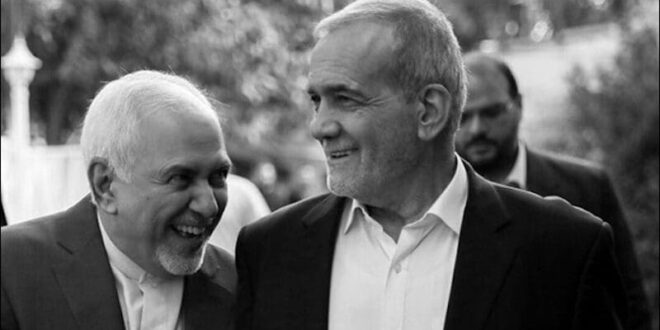As the war in the Middle East is firing back at the warmongering regime in Iran, internal factional conflicts within the regime are intensifying.
On Thursday, October 17, Mohammad Bagher Ghalibaf, the speaker of the regime’s parliament, identified two weaknesses and red lines of the regime while speaking in Mashhad: “conflict” (i.e., factional infighting) and fear and defections within its ranks.
One example of this “conflict” is the threat to prosecute and remove Massoud Pezeshkian from the presidency. The state-run news site Rouydad 24 reported on October 14: “Kamran Ghazanfari, a Tehran MP, says: Pezeshkian is openly committing a crime, and if he does not quickly cancel this illegal [appointment of Mohammad Javad Zarif], we will file a complaint with the judiciary, and Pezeshkian will have to answer for it. He believes ‘Pezeshkian has no defense’ and says he will be sentenced to five to 15 years of social rights deprivation and will effectively be removed from the presidency!”
Earlier, on October 9, MP Hamid Rasaee stated during an open session of the regime’s parliament: “Pezeshkian, in violation of the explicit law, appointed Mr. Zarif, whose child holds U.S. citizenship, as his deputy… Since this law has been breached, the case will be referred to the judiciary…”
The state-run newspaper Shargh, linked to the so-called reformist faction, responded to these aggressive attacks from the rival faction, writing in its October 17 issue: “‘Zarif must go’ serves as a code for the new wave of radical attacks aimed at discrediting Pezeshkian and the 14th administration. The attacks began with Rasaee’s statements and threats, continued by Ghazanfari and Kowsari, and even included fantasies of impeaching the president over the appointment of Zarif.”
But the internal factional strife doesn’t stop there. Amid external crises and the looming possibility of a strategic defeat in their warmongering efforts, even the regime’s reformists are cautioning Pezeshkian that by following the path of his predecessor Ebrahim Raisi, he should brace for repercussions affecting the entire regime.
Saeed Hajjarian, one of the torturers of the 1980s and a theorist of the so-called reformist faction in the 1990s, said in an interview with Shargh regarding the regime’s deadlock and the new president: “In the three elections of 2019, 2021, and 2023, the essence of politics was undermined. From a broader perspective, regional and global orders continued to change, making it impossible for the state to carry on with the same approach in the 2024 elections… Raisi’s administration was completely obedient but proved ineffective… Now, if Pezeshkian and his cabinet try to eliminate creativity and initiative under the banner of ‘consensus,’ they will face the same fate.”
Hajjarian further noted the impact of the “tough gasoline decision” on society and the outcome of regional policies: “In the circumstances imposed on us by the international situation, small movements may emerge, and developments such as Trump’s victory and its consequences might fuel these movements. In such scenarios, vulnerable social groups will unite and put pressure on the government, and naturally, facing a weakened, famine-stricken, and hungry population will be very challenging.”
Abbas Abdi, a staunch supporter of Pezeshkian, wrote in an article titled “Waiting for the Mad”: “If you consider the previous approach as madness, do not forget that most of the forces and executives of this government are, by default, continuing the same traditional methods that have brought society to this point.” He further hinted at the rival faction’s efforts to oust Zarif and replace managers under the guise of “consensus,” adding: “This is not consensus; it is a vulgar power grab in the name of consensus. Defend your competent managers and do not let them face these predatory wolves. Block the unhealthy ways of nominating people for positions.”
The prospect of the regime’s defeat and the risk of widespread protests have intensified the internal crises, with factions tearing into each other.
 Eurasia Press & News
Eurasia Press & News




